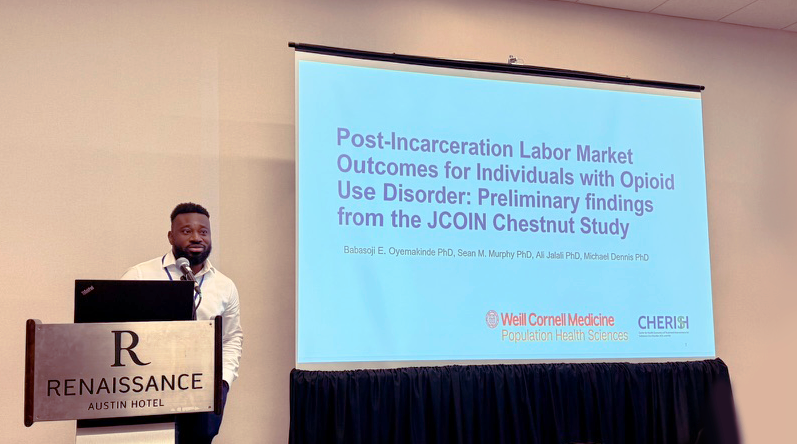
Dr. Babasoji Oyemakinde, postdoctoral associate in population health sciences, has received a scholarship from the Academic Consortium on Criminal Justice Health (ACCJH) for his research on post-incarceration labor market outcomes for individuals with opioid use disorder (OUD).
The ACCJH is a member organization that aims to advance care for individuals and populations within the criminal justice system. The consortium is primarily concerned with experiences and outcomes of health service utilization in those populations, including care provided during incarceration and after community reentry. Their scholarship recognizes emerging research across the criminal-legal field that can inform evidence-based practices and policies.
“Current studies typically focus either on post-incarceration labor outcomes for previously incarcerated individuals or labor outcomes for people with OUD, but there is limited research on the combined population,” said Dr. Oyemakinde. He presented his research at the ACCJH Conference 2025 in Texas, offering a preliminary evaluation of data from the Justice Community Overdose Innovation Network (JCOIN) Chestnut Health Systems Hub that is supported by the National Institute on Drug Abuse. This hub offers care at release with the goal of improving medication for opioid use disorder (MOUD) treatment linkage and retention over time.
“I’m investigating whether post-incarceration labor market outcomes are favorable for this population,” he explained. “There may be support systems in place after community reentry, but those systems may not be maintained over time.” Sustained support networks and long-acting MOUD could promote job stability over time and reduce recidivism.
Though the study is ongoing, Dr. Oyemakinde’s initial findings indicate that self-reported employment and wage data appear reliable. Occupation distribution data suggest a concentration in low-wage, manual labor jobs.
“We do find evidence of discrimination against this population due to stigma or inability for people to compete for jobs,” he added. Dr. Oyemakinde plans to further investigate wage differences, longitudinal patterns in self-reported work hours and more.
He thanks Dr. Sean Murphy, professor of population health sciences, and Dr. Ali Jalali, assistant professor of population health sciences, for their mentorship and collaboration on this study. Dr. Oyemakinde hopes to continue advancing substance use research and improving interventions for vulnerable populations.
- Highlights

